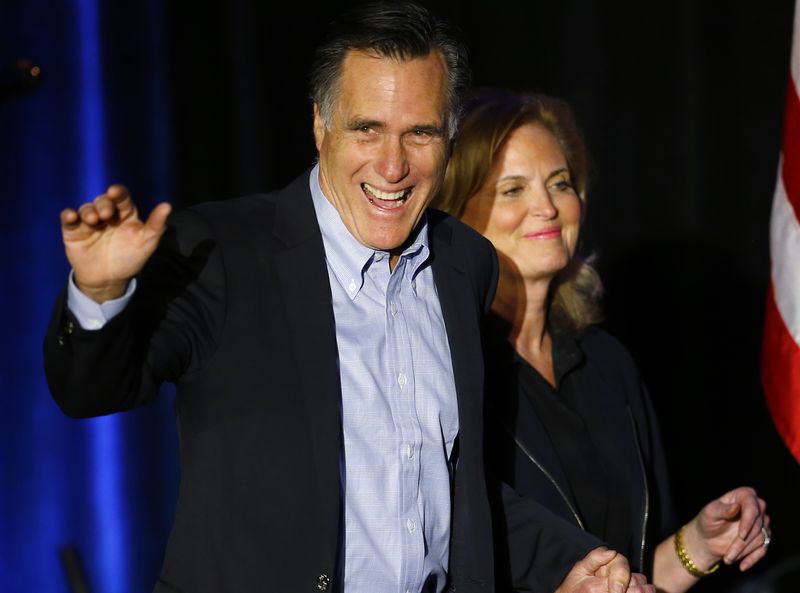By Steve Holland
WASHINGTON (Reuters) - Republican Mitt Romney bowed out of the 2016 U.S. presidential race on Friday after considering a third run, telling supporters it was time for the next generation of party leaders to seek the White House.
Romney's decision helps clarify an emerging Republican field split between potential establishment candidates like former Florida Governor Jeb Bush and conservative voices represented by Texas Senator Ted Cruz and former Arkansas Governor Mike Huckabee.
The move will likely boost Bush, the brother of former President George W. Bush and son of former President George H.W. Bush, even though Romney has privately made known to aides he is not convinced that Bush can defeat Hillary Clinton if she becomes the Democratic presidential nominee.
But Romney's decision also helps other potential candidates such as Florida Senator Marco Rubio, who was on Romney's vice presidential short list in 2012; Wisconsin Governor Scott Walker and New Jersey Governor Chris Christie, all of whom will have a better chance for money and media attention with Romney on the sidelines.
The former Massachusetts governor felt he would win the Republican presidential primary, a former adviser said. But Romney did not think he would present a sufficient "new versus old" contrast for the battle against Clinton, the former first lady, New York senator and secretary of state, who is the early favorite for the Democratic nomination.
"He thinks Jeb would be a perfectly credible nominee but that there are others who might be able to hold up that 'new versus old' banner a little better," the former adviser said, speaking on condition of anonymity.
Romney, the 2012 Republican nominee, announced he would not run in a statement he read to supporters in a conference call from New York.
"After putting considerable thought into making another run for president, I've decided it is best to give other leaders in the party the opportunity to become our next nominee," Romney said in his statement.
He made clear he felt he would be able to raise enough money for a campaign, rejecting a narrative that has grown in recent days as some major 2012 fund-raisers expressed concern about another Romney run.
Those fund-raisers said that since Romney opened the door to a possible candidacy three weeks ago, he had not made clear how his message and inner circle would improve in 2016.
'ALL IN FOR JEB BUSH'
"This means that I'm going to be all in for Jeb Bush," said Theresa Kostrzewa, a Raleigh, North Carolina, Republican who raised money for Romney in 2012.
She said Romney did a great service to the Republican Party by dropping out.
"I think the message he got in the last three weeks was that although many people believed he would've been a great president if he had beaten Barack Obama, he didn't, so it's somebody else's turn now," she said.
In his statement, Romney sounded reluctant to bow out. He noted he was leading in many national polls as well as in key swing states.
An average of recent polls by Real Clear Politics showed Romney with 20 percent support in the Republican field, with Bush coming in second at 11 percent and others in single digits.
"So I am convinced that we could win the nomination but fully realize it would have been a difficult test and a hard fight," Romney said.
He said he still believed he could present a strong message of "making the world safer" and improving the U.S. economy for the middle class, but he did not want to make it more difficult for someone who might have a better chance of getting elected.
"I believe that one of our next generation of Republican leaders, one who may not be as well known as I am today, one who has not yet taken their message across the country, one who is just getting started, may well emerge as being better able to defeat the Democrat nominee," he said.
Romney's decision could help create some space for lesser known candidates.
"If you have Romney, Christie, Bush and maybe Scott Walker all competing for the money and slugging it out for political operatives in the states and all that, sometimes it hurts and makes you weaker," said Republican strategist Charlie Black.
Many potential Romney rivals for the Republican nomination praised him.
Senator Rand Paul of Kentucky said he hoped to work with Romney in the future. In a statement, Bush said he recognized how hard the decision was for him.

"Mitt is a patriot, and I join many in hoping his days of serving our nation and our party are not over," Bush said.